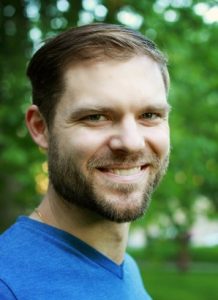
Derek Ruths, now an associate professor at McGill University, earned his BS, MS, and PhD in CS at Rice University.
Derek Ruths approaches his computer science faculty role at McGill University the same way he approaches his startups. The CS alumnus said, “Starting a company is basically the job of a professor. That’s how much of my time is spent: fundraising, recruiting talent, and managing challenging projects. It’s just another form of the work that I love to do as a professor.”
Ruths chose academia because he believes in the importance of solving hard problems and taking fresh new approaches to solving those problems.
His engagement with collaborators extends beyond the university and beyond industry because he sees a necessary, symbiotic relationship between research, industry, government, and non-profit organizations. He said, “For research to generate impact, you have to ask the right research questions — questions that are grounded in real world problems. And for research to generate impact, it has to be used.”
“We need to know the problems we should be solving,” he said. “Entrepreneurship – actually creating companies – is really important for academics to be involved in. The things we work on may not have a ready market. They may be ahead of their time, or we may not find a company that is the obvious fit for what we want to do. Entrepreneurship can be an excellent way of testing out the value of new ideas and approaches.”
When asked about balancing his faculty responsibilities with entrepreneurship, Ruths there is an unhealthy mythology surrounding the one-person startup. “When I explore a new opportunity, I work hard to create a team to tackle it . We all work together – that’s an important reality that isn’t talked about. We love our ‘hero’ stories, but it’s important to realize companies are not started by just one person,” he said.
Ruths began blending academia with entrepreneurship as a Rice University undergraduate. Ken Kennedy was the first professor to give Ruths the opportunity to do research, which led to his first publication, and his first startup.
“Ken Kennedy, who is now a famous former professor of the Computer Science Department, had bought a huge, ImmersaDesk–it filled a whole room and was basically an early virtual reality device. This was back in 1999. He created an advanced, senior-level course to write programs for the ImmersaDesk and I wandered into the class orientation as a starry-eyed sophomore.”
“To his credit, Ken Kennedy was absolutely enthusiastic about getting me involved in the class. He didn’t seem to give it a second thought. His taking a chance on me set the stage for the really formative experiences that I’ve had over the years. Actually, not a month goes by that I don’t spend some time thing about the experience I had with him and the serendipitous ways they’ve had of shaping my life.”
Ruths had begun programming in high school, but he came to Rice to study Physics and Ancient Mediterranean Civilizations. He only taken only the basic COMP courses, but he had become intrigued by the opportunities to use computer science in solving real-world problems. Their research led to Ruths’ first startup, Advanced Reality. “We were building real time collaboration software back before Google Docs existed,” he said.
The more Ruths recognized CS was a problem-solving discipline, the more he was drawn to the major. He said, “Computer science was and is a perfect fit for solving real-world problems in a quantitative and precise way. Of course I’m biased –now I’m a computer science professor– but I see it as a fundamental part of the toolkit of anyone who wants to solve problems.”
But he also encourages students to explore other areas. He said some of the courses that were most formative for him were in anthropology and history. “I dabbled in a lot of things, and that gave me opportunities to think about aspects of the real world I wanted to address or solve and consider how to bring the lens of computation to them.”
Currently, Ruths says he sits at an interdisciplinary boundary with the social sciences. “I work in an area called computational social science, which blends computer science and social science. If there is a reason to support the expansion of computer science to more students, we don’t have to make the argument based on computer science [as a stand-alone department] but because computer science is now an engine for innovation in every discipline,” he said.
He remains driven to find ways to use technology and information to make better decisions. Ruths said, “We are living through a tumultuous era because there is so much technology and information. Consider the echo chamber problem in social media and the abundance of fake news. Information and technology are doing just the opposite of what we want.”
Ruths is committed to using his teaching, research, and consulting resources to help make technology and information work for communities, organizations, governments, and companies in order to build a better world. “Making better decisions,” he said, “applies to individuals getting the information they need to determine how to vote as well as organizations getting the information they need to make better decisions about operational efficiency, or provide services that their customer or constituency really need. How does that fit into computer science? We are living in an era of data deluge. We need the software tools to actually make sense of the data, but we also need to develop critical thinking skills. That is where education is so important. We need to learn how to think about data so we extract the insight we need from it.”
Derek Ruths completed his B.S. in CS in 2003, his M.S. in 2006, and his Ph.D. in 2009. His adviser was Luay Nakhleh.